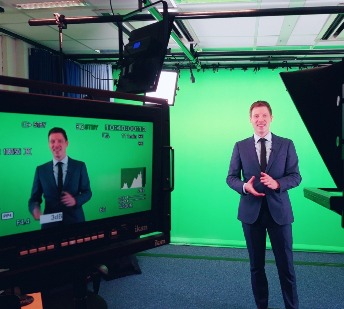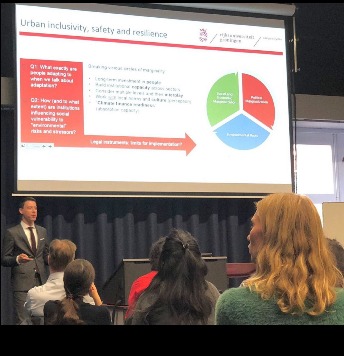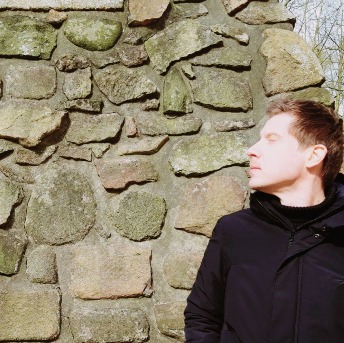Karsten Schulz: Climate change knows no borders

Karsten Schulz is Assistant Professor for Governance and Innovation at Campus Fryslân and coordinates the Climate Adaptation Governance track in the MSc.Cultural Geography program. Before joining Campus Fryslân, Karsten worked as a government consultant in the field of digitalization and as a researcher for a number of international organisations and climate change-related research projects. In this interview, he talks about the intersection of climate change adaptation and technology, his teaching style, his free time-activities, and more.
Sealing the deal
I studied at the University of Bonn in Germany and, funnily, I didn’t even think of pursuing the direction of global environmental governance and climate adaptation until the second half of my Master’s. However, I was particularly inspired by one of my professors, who is a political scientist and also an expert in development politics, so I continued my education in Bonn and received a PhD from the Center for Development Research. Later, I also worked with the United Nations, and as a consultant for the local government, which sealed the deal for me.
The course on Urban Climate Adaptation and Innovation

In total, there are three courses in the Climate Adaptation Governance track and I am teaching one of them in the first term of the second semester. The course is called – Urban Climate Adaptation and Innovation. So what we will deal with is the specifics of adaptation in cities. More than half of the world’s population now lives in cities, so the fight against climate change will be won and decided in urban environments. And that also to some extent depends on innovation. How can we improve living conditions? How can we make our cities more adaptable to different extreme events? For example, more socially equal and evened out so that vulnerable populations are taken into account. All of that is a part of the course. And with regard to innovation, we also look at the technologies such as artificial intelligence, smart cities, blockchain systems. All of these can play a very productive role under certain conditions, but we need to look at the opportunities as well as the risks of these technologies. So we are not studying so much, let's say computer science in terms of innovation, but what we look at is how existing and upcoming technologies have a concrete social effect in society.
How climate and technology intersect
I think there are multiple ways in which technology and climate adaptation intersect. First of all, through energy. Technologies need a lot of energy so we have to think about new ways to power our devices sustainably. On the other hand, we can also use the same devices if they are sustainably sourced and operated to mitigate or adapt to climate change. And one way to do that in adaptation would be to use artificial intelligence or blockchain systems in for example the smart city concept. Or, in the case of blockchain technology, we could apply it in international climate finance to channel disaster risk management funds directly to affected populations. And these are just some examples.
Teaching style

I always try to find a good balance in my classes, combining interactive episodes and discussions with short lecture periods, because I am also very much in favour of conveying knowledge. I like to mix and match and find ways to link theoretical parts to practical examples.
A recipe of a successful student
I think what I found over time is that those students do well who have an intrinsic motivation. They are self-motivated and have a real interest in the topic. And, normally, this mindset then translates into students going above and beyond the reading materials, watching the news, keeping themselves informed. In my view all those are indicators of good students. In Climate Adaptation Governance we are looking for open-minded students who do not shy away from working across disciplines. Of course the motivation, as I have mentioned, plays a role but also the willingness to engage with other disciplines, because climate change knows no borders, neither geographical nor disciplinary borders. We need to work on the issue from different angles – politics, economics, geography, the natural sciences, etc. So that kind of broad-minded attitude plays a big role, I think.
Working in academia in the Netherlands

I really like it here in the Netherlands. I think it’s an excellent academic system with a long tradition that is internationally well-known and well-respected. I wouldn’t make a direct comparison to Germany because the countries are simply so different in size and academic tradition. But what I found is that, here in the Netherlands, hierarchies are more flat compared to German faculties, where often a lot of decisions and processes circle around the full professors. And I think here it is a bit more evened out, which I personally find very nice.
And in my free time…

Oh, I’m an absolute travel-enthusiast! I’ve been to quite a few countries and there are still many more on my bucket list. I like to practice martial arts, to go on hikes and outdoors. I am also a huge science fiction fan. I like to read fiction and fantastic literature, especially because it links so much to my job of thinking about the future, and science fiction is a particularly fascinating way of how different people from different backgrounds have been thinking, throughout history, about how the future may look like.

